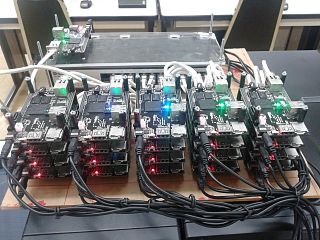
A Beowulf cluster is a computer cluster of what are normally identical, commodity-grade computers networked into a small local area network with libraries and programs installed which allow processing to be shared among them. The result is a high-performance parallel computing cluster from inexpensive personal computer hardware.

Sceafa was an ancient Lombardic king in English legend. According to his story, Sceafa appeared mysteriously as a child, coming out of the sea in an empty skiff. The name also appears in the corrupt forms Seskef, Stefius, Strephius, and Stresaeus. Though the name has historically been modernized Shava, J. R. R. Tolkien used the modern spelling Sheave.

Quadrics was a supercomputer company formed in 1996 as a joint venture between Alenia Spazio and the technical team from Meiko Scientific. They produced hardware and software for clustering commodity computer systems into massively parallel systems. Their highpoint was in June 2003 when six out of the ten fastest supercomputers in the world were based on Quadrics' interconnect. They officially closed on June 29, 2009.
Old English Scylding and Old Norse Skjöldung, meaning in both languages "People of Scyld/Skjöld" refers to members of a legendary royal family of Danes, especially kings. The name is explained in many texts, such as Friedrich Christoph Dahlmann's 'Research on the Field of History', by the descent of this family from an eponymous king Scyld/Skjöld, but the title is sometimes applied to rulers who purportedly reigned before Scyld/Skjöld, and the supposed king Scyld/Skjöld may be an invention to explain the name. There was once a Norse saga on the dynasty, the Skjöldunga saga, but it survives only in a Latin summary by Arngrímur Jónsson.
Heremod is a legendary Danish king and a legendary king of the Angles who would have lived in the 2nd century and known through a short account of his exile in the Old English poem Beowulf and from appearances in some genealogies as the father of Scyld. He may be the same as one of the personages named Hermóðr in Old Norse sources. Heremod may also be identical to Lother in Saxo Grammaticus' Gesta Danorum or the same history may have been applied to two originally separate figures.

Beowa, Beaw, Bēow[beːow], Beo or Bedwig is a figure in Anglo-Saxon paganism associated with barley and agriculture. The figure is attested in the Anglo-Saxon royal genealogies as they were extended in the age of Alfred, where Beowa is inserted as the son of Scyld and the grandson of Sceafa, in lineages carried back to Adam. Connections have been proposed between the figure of Beowa and the hero Beowulf of the poem of the same name and English folk song figure John Barleycorn.
The Stone Soupercomputer was a Beowulf-style computer cluster built at the US Oak Ridge National Laboratory in the late 1990s.

Linux Users' Group of Davis is a users' group of students and faculty from the University of California, Davis, Information technology professionals from the Sacramento region, and hobbyists interested in Linux and free and open-source software. It holds regular meetings in Davis, California, and holds installfests on a regular basis. Its members participate with each other online in numerous mailing lists and via Internet Relay Chat.
Penguin Computing is a private supplier of enterprise, high-performance computing (HPC) and cloud computing solutions in North America and is based in Fremont, California.

Skjöldr was among the first legendary Danish kings. He is mentioned in the Prose Edda, in Ynglinga saga, in Chronicon Lethrense, in Sven Aggesen's history, in Arngrímur Jónsson's Latin abstract of the lost Skjöldunga saga and in Saxo Grammaticus' Gesta Danorum. Under the name Scyld he also appears in the Old English poem Beowulf. The various accounts have little in common.
The Parallel Virtual File System (PVFS) is an open-source parallel file system. A parallel file system is a type of distributed file system that distributes file data across multiple servers and provides for concurrent access by multiple tasks of a parallel application. PVFS was designed for use in large scale cluster computing. PVFS focuses on high performance access to large data sets. It consists of a server process and a client library, both of which are written entirely of user-level code. A Linux kernel module and pvfs-client process allow the file system to be mounted and used with standard utilities. The client library provides for high performance access via the message passing interface (MPI). PVFS is being jointly developed between The Parallel Architecture Research Laboratory at Clemson University and the Mathematics and Computer Science Division at Argonne National Laboratory, and the Ohio Supercomputer Center. PVFS development has been funded by NASA Goddard Space Flight Center, The DOE Office of Science Advanced Scientific Computing Research program, NSF PACI and HECURA programs, and other government and private agencies. PVFS is now known as OrangeFS in its newest development branch.
Rocks Cluster Distribution is a Linux distribution intended for high-performance computing clusters. It was started by National Partnership for Advanced Computational Infrastructure and the San Diego Supercomputer Center (SDSC) in 2000 and was initially funded in part by an NSF grant (2000–07) but was funded by the follow-up NSF grant through 2011. Rocks was initially based on the Red Hat Linux distribution, however modern versions of Rocks were based on CentOS, with a modified Anaconda installer that simplifies mass installation onto many computers. Rocks includes many tools which are not part of CentOS but are integral components that make a group of computers into a cluster.
Open Source Cluster Application Resources (OSCAR) is a Linux-based software installation for high-performance cluster computing. OSCAR allows users to install a Beowulf type high performance computing cluster.
The Kentucky Linux Athlon Testbed (KLAT2) is a 64+2 node Beowulf cluster built by the University of Kentucky College of Engineering in 2000. The cluster used entirely off the shelf components.

A computer cluster is a set of loosely or tightly connected computers that work together so that, in many respects, they can be viewed as a single system. Unlike grid computers, computer clusters have each node set to perform the same task, controlled and scheduled by software.

The Slurm Workload Manager, or Slurm, is a free and open-source job scheduler for Linux and Unix-like kernels, used by many of the world's supercomputers and computer clusters.
Linux kernel-based operating systems have been widely adopted in a very wide range of uses. All the advantages and benefits of free and open-source software apply to the Linux kernel, and to most of the rest of the system software.

An Aiyara cluster is a low-powered computer cluster specially designed to process Big Data. The Aiyara cluster model can be considered as a specialization of the Beowulf cluster in the sense that Aiyara is also built from commodity hardware, not inexpensive personal computers, but system-on-chip computer boards. Unlike Beowulf, applications of an Aiyara cluster are scoped only for the Big Data area, not for scientific high-performance computing. Another important property of an Aiyara cluster is that it is low-power. It must be built with a class of processing units that produces less heat.









